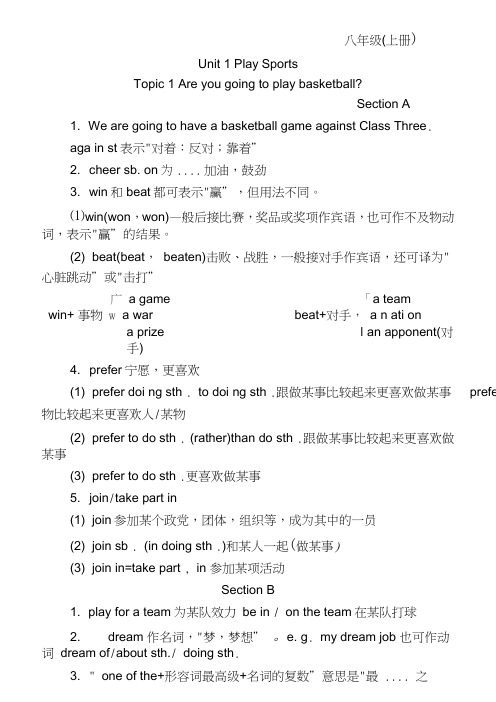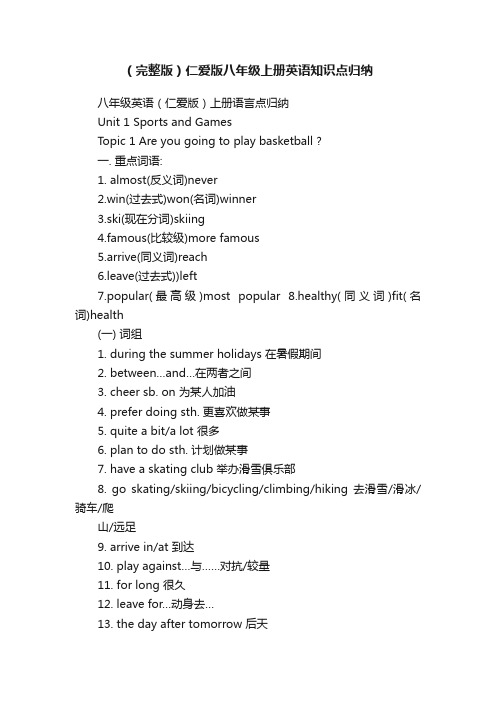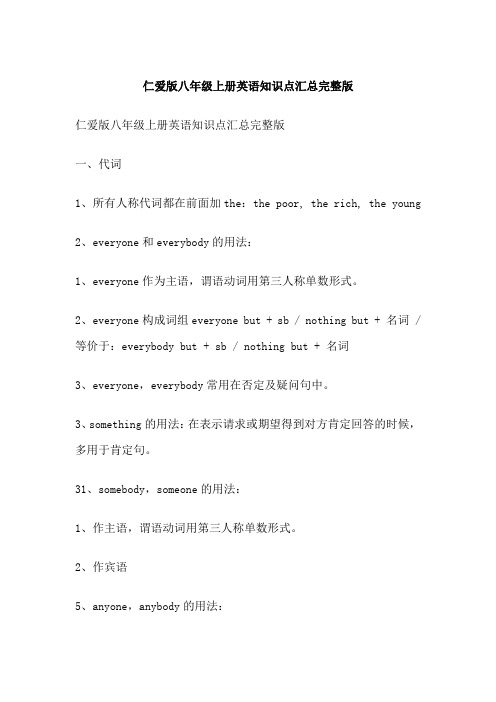2018年仁爱版八年级英语上册全册知识点归纳
仁爱版八年级上册英语知识点汇总(完整版)

16. Jump out 跳出去17.Lose oneself in+(doing)sth 沉迷于什么18. Such+(a/an+adj.+n.单数/adj.+n.复数/adj.+n.不可数)+thatSo+adj./adv.+that 如此...以致于...Unit3 Topic31. Hold on,please 请稍等5. Agree with sb. 同意人看法6. Pass by 经过7. By chance 偶然8. Fall down on... 摔倒在...9. In the street在街上;on the road在路上 10. Warm ...up 使...温暖11. Hold....in one’s arms抱着...怀里 12. Knock at ...敲... 13. Without+doing不做14. In the early 年代+s 在什么年代早期15. Stop doing sth停止做事(正在做);stop to do sth停止去做事(想要去做) 16. Voice(人声);sounds(全部声音);nois(噪声) 17. In the low voice 低声地说 18. Follow...order 遵守...命令 19. Get lost 迷路20. Long long ago 很久很久以前21. Last night=yesterday evening 昨晚Unit4 Topic11. Think about (doing) sth. 考虑做2. In the countryside /city在农村/城市3. On the farm在农场上4. Live a … life 过着…的生活5. As we know 众所周知6. Cover ...with .... 用…覆盖7. On Earth = on the earth在地球上8. Play a part in ( doing ) sth. 在(做)事中起作用 9. Die out 灭绝10. Thousands / hundreds of 数以千/百计 11. Control the climate 调节气候 12. In fact 事实上,实际上13. Protect … from .....保护…免受…的伤害 14. Feed on 以……为食15. Fewer and fewer 越来越少(修饰可数名词) 16. Less and less 越来越少(修饰不可数名词)17. More and more越来越多(可数,不可数都可以) 18. In danger 处于危险中 19. Out of danger脱险20. In the south of China 在中国南部 21. A type of = a kind of 一种… 22. Kill ..... for … 为…杀死…23. Pl.goose--geese ;sheep--sheep; mouse--mice 24. Cut down 砍伐25. On the land;in the sea;in the sky 在陆地上;在海里;在天空 26. 数字% 读作:数字 percentUnit4 Topic21. Fall on… 掉在…上2. Be missing / lost失踪,丢失3. Lose one’s life / lives失去生命4. Lose one’s homes失去家园5. Ask sb. for help = turn to sb. 向人求助6. Stay/keep calm 保持冷静7.Protect …with… 用…保护… 8. Take a lift 乘电梯9. In the middle/center of 在…中间10. A way to do sth. = a way of doing sth.做…的方法 11. Remember to do 记得做事12. Remember doing 记得做过事 13. In a doorway 在过道 14. Turn on/off 打开/关闭 15. Turn up/down 调高/调低16. Jump off… 从…跳下17. The whole day = all day 整天18. Return to… = go back to… 回到… 19. Over again 再次,重新20. Millions of 数以百万计的… 21. Move around 走来走去,走动 22. On+具体其中一天23. Send sb. sth. = send sth. to sb. 发送给人物 24. Send for 派人去请,召唤 25. Inthe fire在火灾中29. Run out of... 跑出...外30. Protect...from+doing保护...免受...的伤害 31. Close to 靠近Unit4 Topic31. on the Internet 在网上2. face to face 面对面;neck and neck 齐头并进;hand in hand 手;back to back 背靠背3. find out 查明,找出4. let/make/have sb. do 让人做事5. make… into use 使…投入使用6. in the 1960s 在二十世纪六十年代7. be not sure +whether/if 不确定是否… 8. put … into 把…放进…9. for the better 向着较好的情况(转变)---- for the worse 向着较坏的情况(转变)10. use sth. to do 用…来做… 11. surf the Internet 上网12. change … into …= turn … into 把…转变成… 13. look up 查找,向上看14. be different from 和…不同15. lose oneself in (doing) sth. 沉迷于…,专心致志于… 16. search for … 搜寻,寻找17. if so 如果是这样 if not 如果不是这样 18. visit a website 访问一个网站 19. help sb.(to) do 帮助人做…八年级语法汇总一. 一般将来时:Be going to do/will be 的用法 Will用法:肯定句:主+will+V.原型+其他否定句:主+will not(won't)+V.原型+其他一般疑问句:will+主+V.原型+其他;回答:肯定回答:Yes,主+will 否定回答:No,主+won't特殊疑问句:疑问词+will+V.原型+其他表示位置移动的动词,可以用现在进行时表示一般将来时二.情态动词:情态动词 Can Could May Might Shall Should Will Would Must Need 否定式及否定式简略形式Can not=can’t Could not=couldn’t May not=mayn’t Might not=mightn’t Shall not=shan’t Should not=shouldn’t Will not=won’t Would not=wouldn’t Mustnot=mustn’t Need not=needn’t 情态V.+do must和have to ,must表主观意志,而have 表示由于客观因不得不做事。
(完整word版)初中英语仁爱版八年级上册知识点梳理,推荐文档

八年级(上册)Unit 1 Play SportsTopic 1 Are you going to play basketball?Section A1. We are going to have a basketball game against Class Three.aga in st表示"对着:反对;靠着”2. cheer sb. on为.... 加油,鼓劲3. win和beat都可表示"赢”,但用法不同。
⑴win(won,won)—般后接比赛,奖品或奖项作宾语,也可作不及物动词,表示"赢”的结果。
(2) beat(beat,beaten)击败、战胜,一般接对手作宾语,还可译为"心脏跳动”或"击打”广 a game 「a teamwin+ 事物w a war beat+对手,a n ati ona prize I an apponent(对手)4. prefer宁愿,更喜欢(1) prefer doi ng sth . to doi ng sth .跟做某事比较起来更喜欢做某事prefe 物比较起来更喜欢人/某物(2) prefer to do sth . (rather)than do sth .跟做某事比较起来更喜欢做某事(3) prefer to do sth .更喜欢做某事5. join/take part in(1) join参加某个政党,团体,组织等,成为其中的一员(2) join sb . (in doing sth .)和某人一起(做某事)(3) join in=take part , in 参加某项活动Section B1. play for a team为某队效力be in / on the team在某队打球2. dream 作名词,"梦,梦想” 。
e. g. my dream job 也可作动词dream of/about sth./ doing sth.3. " one of the+形容词最高级+名词的复数”意思是"最 .... 之一” 。
2018年仁爱英语--八年级上知识点汇总.docx

2017 年-2018 年最新仁爱英语八年级上册知识点汇总Unit1 topic1P11 . play basketball 打球2 . cheer sb on 某人加油3.have a basketball game行一球比4. summer holiday=summer vacation暑假5.the school rowing team学校划船6.①see sb. do sth.看某人做了某事②s ee sb. doing sth. 看某人正在做某事7.Do you row much?=Do you often row? 你常划船?8.quite a lot=quite a bit. 多;大量9.一般将来:be going to do 与 will 区①be going to 用于主判断,及人主上划或安排将要去做的事情。
② will 多用于客的情况,即客上将要生的事情。
例: I ’m not going to ask her. 我不打算去她。
It will be rainy tomorrow. 明天会下雨。
P31.play for⋯⋯效力2.grow up 大成人;成3.在复合句中,当主句将来或表将来意 ,状从句必用一般在表将来例: I ’ll write to her when I have time.Turn off the lights before you leave.P51.go cycling 去自行2.go mountain climbing去爬山3.be good at擅于某事=do well in4.next weekend下周末5.the long jump跳6.the high jump跳高7.take part in参加8.①spend⋯⋯(in) doing sth花(、金)做某事②s pend ⋯⋯ on sth 在某事 / 某物上花或金例:① He spends half an hour (in) playingcomputer games every day.②M y father spent fifty yuan on this book.9.a school sports meet 学校运会10.①be good for⋯⋯有益②b e bad for⋯⋯有害11.①all over the world全世界②around the world全世界③throughout the world全世界12.make him strong使他身体壮make+sb./sth.+adj.使某人 / 某物怎么13.keep her heart and lungs healthy保持她心肺健康keep+sb./sth.+adj. 使某人 / 某物一直于某种状14.①a way to do sth.的“⋯⋯方法”②a way of doing sth.“⋯⋯的方法”例: a good way to keep fit保持健康的一种好方法15.keep healthy 保持健康keep fit 保持健康16.There be 句型的一般将来构:①There will be⋯⋯②T here is/are going to be ⋯⋯There is going to be a school sports meet next weekend.17.the day after tomorrow后天P71.①play with和⋯⋯一起玩②p lay against 与⋯⋯行(抗性的)比2.①arrive in+ 大地点“到达⋯⋯”arrive at+ 小地点“到达⋯⋯”②g et to+ 地点“到达⋯⋯”③reach+ 地点“到达⋯⋯”4. It’ s too bad that+句子=It ’ s itya pthat+ 句子“很憾⋯⋯”2例: It ’s too bad that I can’t help you. =It ’ s a pity that I can’ t help you.5.在行表将来的用法 :英中表示位置移的,如go, come, leave, arrive, fly 可用在行表将来They are flying to New York tomorrow.I ’ m coming to see you this afternoon.6.leave for 身去某地;启程去某地leave from 离开某地Unit1 topic2P91.have a soccer game 行一足球比2.fall ill 生病;患病 (患病的程 ) be ill 生病了 (患病的状 )3.be glad to do sth. 意做某事4.①Do/Would you mind doing sth.?你介意做某事?②W ould you mind not doing sth.? 你介意不要做某事?例:① Do/Would you mind giving me a hand?肯定回答:Not at all./Of course not./Certainly not.否定回答: I ’m sorry, I’m afraid I can’t.②W ould you mind not putting your bikehere?Sorry./I’ m sorry about that.5.pass sb. sth.=pass sth.to sb.把某物某人kick sb.sth.=kick sth.to sb. 把某物踢某人give sb.sth.=give sth.to sb. 把某物某人show sb.sth.=show sth.to sb. 某人看某物6.have a try 一7.somewhere else 的地方8.give sb. a hand 帮某人一个忙P111.shout at sb. 某人大声2.do one ’ s best to do尽sth力.干某事=try one’ s best to do sth.3.be angry with sb. 生某人的气4.I ’ m sorrywhatf I said. 我我的感到抱歉。
(完整版)(完整版)仁爱版八年级上册英语知识点总结,推荐文档

八年级上英语语法1)leave 的用法1.“leave+地点”表示“离开某地”。
例如:When did you leave Shanghai?你什么时候离开上海的?2.“leave for+地点”表示“动身去某地”。
例如:Next Friday, Alice is leaving for London.下周五,爱丽斯要去伦敦了。
3.“leave+地点+for+地点”表示“离开某地去某地”。
例如:Why are you leaving Shanghai for Beijing?你为什么要离开上海去北京?2)情态动词should“应该”学会使用should 作为情态动词用,常常表示意外、惊奇、不能理解等,有“竟会”的意思,例如:How should I know? 我怎么知道?Why should you be so late today? 你今天为什么来得这么晚?should 有时表示应当做或发生的事,例如:We should help each other.我们应当互相帮助。
我们在使用时要注意以下几点:1.用于表示“应该”或“不应该”的概念。
此时常指长辈教导或责备晚辈。
例如:You should be here with clean hands. 你应该把手洗干净了再来。
2.用于提出意见劝导别人。
例如:You should go to the doctor if you feel ill. 如果你感觉不舒服,你最好去看医生。
3.用于表示可能性。
should 的这一用法是考试中常常出现的考点之一。
例如:We should arrive by supper time. 我们在晚饭前就能到了。
She should be here any moment. 她随时都可能来。
31.what 与which 都是疑问代词,都可以指人或事物,但是what 仅用来询问职业。
如:What is your father? 你父亲是干什么的?该句相当于:What does your father do?What is your father's job?Which 指代的是特定范围内的某一个人。
(完整版)仁爱版八年级上册英语知识点归纳

(完整版)仁爱版八年级上册英语知识点归纳八年级英语(仁爱版)上册语言点归纳Unit 1 Sports and GamesTopic 1 Are you going to play basketball ?一. 重点词语:1. almost(反义词)never2.win(过去式)won(名词)winner3.ski(现在分词)skiing4.famous(比较级)more famous5.arrive(同义词)reach6.leave(过去式))left7.popular(最高级)most popular 8.healthy(同义词)fit(名词)health(一) 词组1. during the summer holidays 在暑假期间2. between…and…在两者之间3. cheer sb. on 为某人加油4. prefer doing sth. 更喜欢做某事5. quite a bit/a lot 很多6. plan to do sth. 计划做某事7. have a skating club 举办滑雪俱乐部8. go skating/skiing/bicycling/climbing/hiking 去滑雪/滑冰/骑车/爬山/远足9. arrive in/at 到达10. play against…与……对抗/较量11. for long 很久12. leave for…动身去…13. the day after tomorrow 后天14. China’s national team 中国国家队15. play baseball 打棒球16. at least 至少17. What a shame! 多羞愧!18. be good at 善于做某事19. take part in 参加20. all over the world 全世界21. be good for 对……有益22. a good way 一种好方法23. keep fit/healthy 保持健康24. relax oneself 放松某人自己二. 重点句型1. What’s your favo rite sport? = What sport do you like best? 你最喜爱的运动是什么?2. Which sport do you prefer? = Which sport do you like better? 你更喜欢什么运动?I prefer skating. = I like skating better. 我更喜欢滑雪.3. Do you skate much? = Do you often skate? 你常滑雪吗?4. She spends at least half an hour in the gym every day. 每天她至少花半小时在体育馆.5. She plays baseball pretty well and she is also good at jumping. 她棒球打得相当好而且擅长于跳.6. What kind of sports do you like? = Which sport do you like? 你喜欢哪种运动?7. Would you like to come and cheer us on ? 你愿意来为我们加油吗?8. What are you going to be when you grow up? 当你长大后做什么?9. There is going to be a school sports meet next month.下月有一场运动会。
(完整版)仁爱版八年级上册英语知识点汇总(完整版)

八年级上学期英语知识点八年级英语短语总汇Unit1 Topic11.be going to do 打算做某事2.See sb do sth看见某人做某事(全过程)See sb doing sth看见某人正在做某事(正在进行)3.cheer sb on为...加油4.Play against=fight against 与...对抗/大战5.Be against--Be for 反对—赞同6.practice+doing 练习做...7.Prefer+doing 跟喜欢...Prefer doing to doing 或比起做后者,更喜欢做前者Perfer to do, quite a lot/bit/often.Which one do you prefer, which kind of that?10. Join+某人/组织Join in+活动/比赛加入Take part in+活动/比赛Be in+活动/比赛13.Know about... 知道/了解有关于...当时间来临时,我们将采取行动;这是我们的计划。
15. It takes sb+时间/钱 to do sthSpend+时间/钱+(in) doing sth 在某方面花费多少Spend+时间/钱+on+n.物+cost+时间/钱16.There be going to be=there will be 这里将会有...17.Be good at+(doing)sth=Do well in+(doing)sth 擅长做...18.Be sure that+宾语从句确信... 19.Be sure to do 肯定要做...20.Be sure of/about 对...有把握 21.At the weekend 在周末22.Make sb/sth+adj 使...处在什么状态23.Keep+adj 保持...;keep sb/sth+adj 使...保持什么状态24.A way to 一种...的方法 25.Relax oneself 使某人自己放松26.Play for 为...效力27.Arrive in=get to=reach+大地方;Arrive at+小地方28.Excited(人);exciting(物)29.Leave for动身做某地;leave A for B 离开A地去B地Unit1 Topic21.Could you(not)....=cuold/would you please(not)do=would/do youmind(not)doing=Would you mind (not)+if+从句2.fall ill=be ill 生病其中之一是n的复数形式.优化后的文本可以是:Use 'keep doing' for continuous action and 'keep on doing' for repeated action with intervals.5.Help sb.=give sb a hand 帮助某人6.V.+间宾(人)+直宾(物)=V.+直宾+to/for+间宾7.Sure=certainly=of course 当然8.Not at all=certainly not=of course not 不介意9.Never mind=it’s nothing=it’s doesn’t matter 没关系乱扔11.Adj.修饰不定代词放其后12.Be sorry for/about.... 对...感到内疚13.What do you mean by...?=what does...mean?=what’s the meaning of...?意思是什么?14.Shout at sb. 斥责某人15.Do/try one’s best to do sth 尽某人做大的努力做某事16.Be angry with sb. For doing sth 因为某人做某事而生气17.be angry at/about sth 因某事而生气18.be angry with 因...而生气19.With the help of sb.=with one’help 在某人的帮助下20.Say...to sb. 对某人说...e into being=be born 形成/产生22.So...that... 如此...以致...=to...too... 太...而不能...23.A century=one hundred year 一个世纪24.Over=more than 超过25.Through(中间)=aross(表面) 通过阻止他们从做28.It’s + adj +(for sb.)+to do (对某人来说)做...是...29.Another+基数词又一,在一; other +n.复数另外的Around=all_over 处到处31.Just for...只是为了...32.Turn...into... 使...变成...33.Sit around 围坐在34.Get from doing 得到...35.Such as 后不可列出前面所提过的所有东西36.A number of+n.可数复数许多的;the number of+n.单数 ...的数量37.Hero 复数(Pl.) heroesUnit1 Topic31.连字符后不加soman则例外,需用复数。
仁爱版八年级上册英语知识点汇总完整版

仁爱版八年级上册英语知识点汇总完整版仁爱版八年级上册英语知识点汇总完整版一、代词1、所有人称代词都在前面加the:the poor, the rich, the young2、everyone和everybody的用法:1、everyone作为主语,谓语动词用第三人称单数形式。
2、everyone构成词组everyone but + sb / nothing but + 名词 / 等价于:everybody but + sb / nothing but + 名词3、everyone,everybody常用在否定及疑问句中。
3、something的用法:在表示请求或期望得到对方肯定回答的时候,多用于肯定句。
31、somebody,someone的用法:1、作主语,谓语动词用第三人称单数形式。
2、作宾语5、anyone,anybody的用法:1、用作主语,谓语动词用第三人称单数形式2、用作宾语3、用在否定及疑问句中6、none的用法:1、none作主语,可指人,也可以指物。
谓语动词既可以用单数,也可以用复数形式。
2、none作宾语3、none用于否定及疑问句中7、every one的用法:every one = everyone 表示客观事实,即大家公认的事实置于所修饰词之后。
如: She cleaned every surface in the room, She cleaned every one of the windows.二、副词及其比较级1、very修饰形容词,副词原型 (not very difficult不难)2、quite修饰形容词,副词原型 (not quite good,不够好)3、too修饰形容词,副词原型 (The book is too difficult/ long for you to read这本书对你来说太难/太长而难以阅读)4、“很,非常”除了修饰形容词原级外,还可以修饰比较级和副词原形(如:very much,much)5、almost和nearly一样都表示“几乎”如:nearly ten o’clock / almost ten o’clock6、as…as之间用形容词或副词的原级,“和……一样”,不能用比较级。
仁爱版2018年八年级英语上册全册知识点归纳

仁爱版八年级英语上册期末复习知识点汇编精华版Unit 1&考点词汇against , cheer, team , win , join , club ,volleyball ,dream , grow , future ,record ,gold , hour , baseball ,heart , relax , leave , ill , mind , practice , throw , myself,care1ess , chance , nothing , invent, score , side , follow ,become , however ,tired , mile , instead , habit , feel ,foreign ,maybe , shall , pick , hit , winner , finish ,encourage , visitor , environment ,modem , ring , symbol &目标短语cheer... on 为……加油quite a bit/ a lot 许多,大量play for 为……效力grow up 长大成人,成长in the future今后,在将来give up 放弃take part in =be in =take part in 参加,加入both...and... 两个都,既……又……spend... (in) doing sth.=spend …on sth. 花费(时间)做…… pretty well 相当好all over the world=throughout the world=around the world 全世界be good for 对……有益keep fit=keep healthy=stay healthy 保持健康leave for 动身去某地fall ill=be ill 患病arrive in/ at(小地点用at,大地点用in) =get to=reach 到达(某地) be glad to (do)乐意于…right away=right now=at once=in a minute 立刻,马上make one's bed 整理床铺do sb. a favor=give sb. a hand=help sb. 帮助某人shout at sb. 朝某人大叫be angry with sb. 生(某人)的气be angry at/about sth.因某事而生气(注意:be 有形式变化)do one's best=try one ’s best 尽(某人)最大努力(后接不定时to do 形式) keep doing sth. 继续做某事tum down 关小,调低(反):turn up 开大,调高;turn on 打开(反):turn off关闭take a seat =have a seat =sit down 坐下,就座as well 也,还有instead of 代替,而不是more and more 越来越(多的) (反):less and less 越来越(少)stand for 象征build up 使……增强(buil sb. up 增强某人体质)at least 至少,不少于be ready for=get ready for=prepare for为……作准备be able to=can 能够(后接动词原形,be有各种形式,can 只有时态变化) have fun=have a good time=enjoy oneself玩得高兴(oneself 为反身代词,根据主语用相应形式) &重点句型1. We are going to have a basketball game against Class Three on Sunday.2. I hope our team will win.3. —Which sport do you prefer , cycling or rowing? —I prefer rowing.4. —Are you going to join the school rowing club? —Yes , I am. / No , I'm not.5. —What are you going to be when you grow up? —I'm going to be a dancer.6. She spends half an hour doing exercise in the gym every day.7. They are sure that she will win. 8. —Michael , could you please do me a favor? —Sure. What is it?9. —Would you mind if I try it again? —Certainly not. Please do.10. —I'm sorry I'm late for class. —That's OK. Please take a seat. 11. That's very kind of you , but I can manage it myself.12. What do you mean by saying that? 13. We are sure to win next time. 14. I'll take part in the school meet. 15. There will be another exciting relay race this afternoon.。
- 1、下载文档前请自行甄别文档内容的完整性,平台不提供额外的编辑、内容补充、找答案等附加服务。
- 2、"仅部分预览"的文档,不可在线预览部分如存在完整性等问题,可反馈申请退款(可完整预览的文档不适用该条件!)。
- 3、如文档侵犯您的权益,请联系客服反馈,我们会尽快为您处理(人工客服工作时间:9:00-18:30)。
仁爱版八年级英语上册期末复习知识点汇编精华版Unit 1&考点词汇against , cheer, team , win , join , club , volleyball ,dream , grow , future ,record ,gold , hour , baseball ,heart , relax , leave , ill , mind , practice , throw , myself,care1ess , chance , nothing , invent, score , side , follow ,become , however , tired , mile , instead , habit , feel ,foreign , maybe , shall , pick , hit , winner ,finish ,encourage , visitor , environment , modem , ring , symbol&目标短语cheer... on 为……加油quite a bit/ a lot 许多,大量play for为……效力grow up 长大成人,成长in the future 今后,在将来give up 放弃take part in =be in =take part in参加,加入both...and... 两个都,既……又……spend... (in) doing sth.=spend…on sth. 花费(时间)做…… pretty well 相当好all over the world=throughout theworld=around the world全世界be good for 对……有益keep fit=keep healthy=stay healthy保持健康leave for 动身去某地fall ill=be ill 患病arrive in/ at(小地点用at,大地点用in) =get to=reach到达(某地) be glad to (do)乐意于…right away=right now=at once=in a minute 立刻,马上make one's bed 整理床铺do sb. a favor=give sb. a hand=help sb. 帮助某人shout at sb. 朝某人大叫be angry with sb. 生(某人)的气be angry at/about sth.因某事而生气(注意:be有形式变化)do one's best=try one’s best 尽(某人)最大努力(后接不定时to do形式) keep doing sth. 继续做某事tum down 关小,调低(反):turn up开大,调高;turn on打开(反):turn off 关闭take a seat =have a seat =sit down 坐下,就座as well 也,还有instead of 代替,而不是more and more 越来越(多的) (反):less and less越来越(少)stand for 象征build up 使……增强(buil sb. up增强某人体质)at least 至少,不少于be ready for=get ready for=prepare for 为……作准备be able to=can 能够(后接动词原形,be 有各种形式,can只有时态变化)have fun=have a good time=enjoy oneself 玩得高兴(oneself为反身代词,根据主语用相应形式)&重点句型1. We are going to have a basketball game against Class Three on Sunday.2. I hope our team will win.3. —Which sport do you prefer , cycling or rowing? —I prefer rowing.4. —Are you going to join the school rowing club? —Yes , I am. / No , I'm not.5. —What are you going to be when you grow up? —I'm going to be a dancer.6. She spends half an hour doing exercise in the gym every day.7. They are sure that she will win.8. —Michael , could you please do me a favor? —Sure. What is it?9. —Would you mind if I try it again? —Certainly not. Please do.10. —I'm sorry I'm late for class.—That's OK. Please take a seat.11. That's very kind of you , but I can manage it myself.12. What do you mean by saying that?13. We are sure to win next time.14. I'll take part in the school meet.15. There will be another exciting relay race this afternoon.16. I'll be able to take part in the Olympic Games.&功能意念1. 请求允许—May I come in? —Yes , please.—Would you mind teaching me?—Not at all. /Of course not.—Would you mind not putting yourbike here? —Sorry. I'll put itsomewhere else.—Would/ Do you mind if l open thewindow? —You'd better not. /I'm sorry, it's not allowed.—Could you please do me a favor?—Sure/Certainly. What's it?—Can/Could l use your telephone?—Of course , you can.2. 道歉Sorry. /I'm sorry. /Excuse me , please./I beg your pardon.—I'm sorry. I'm late for class.—That's OK. Please take a seat.—I'm sorry for what I said. —It'snothing.—I'm sorry to trouble you. —Nevermind.—I'm sorry for losing your book. —Oh, it doesn't matter,I have another one. 3. 约会—When shall we meet? —Let'smake it half past six.—Where shall we meet? —At theschool gate.—Will you be free this Sunday? —Yeah, I think I will.—Let's make it 4: 30. —All right.See you then.—Do you have time thisafternoon?=Are you free thisafternoon?—I'm afraid I have no time then./Sorry , I won't be free then. But I'll befree tomorrow.—Could we meet at 4:30? — Yes ,I'll be free then.—How about tomorrowmorning?(=what about,后接动词要用v.-ing形式)—All right. See you then.&语法精粹1.掌握一般将来时be going to/will +动词原形的用法。
2. 学会使用Would /Do you mind...? 的用法。
&考点剖析1. I saw you play basketball almost every day during the summer holidays. 在暑假我看你几乎每天打篮球。
see是感官动词,后可接不带to 的不定式或现在分词作宾语补足语。
即: see sb. do sth. 或see sb. doing sth. ,但两者是有区别的:不定式表示整个动作过程,而现在分词表示正在进行的动作(不管是不是全过程)。
如:I saw him cross the road. 我看见他穿过了马路。
(指我看到他离开这边人行道到另一边的人行道,穿过马路的整个过程。
)I saw him crossing the road. 我看见他正在穿越马路。
(强调看到的动作正在进行。
)【链接】感官动词还有: feel , hear, listen to , look at , find , notice , watch 等。
如:We often hear him sing in his garden.我们经常听到他在花园里唱歌。
Can you feel the train slowing down?你能感觉到火车在慢下来吗?2. —"Which sport do you prefer , cycling or rowing? 骑车和划船,你更喜欢哪种运动?—I prefer rowing. 我更喜欢划船。
prefer是指两者中偏爱或更喜欢一者。
其用法为prefer +动名词/名词/动词不定式。
